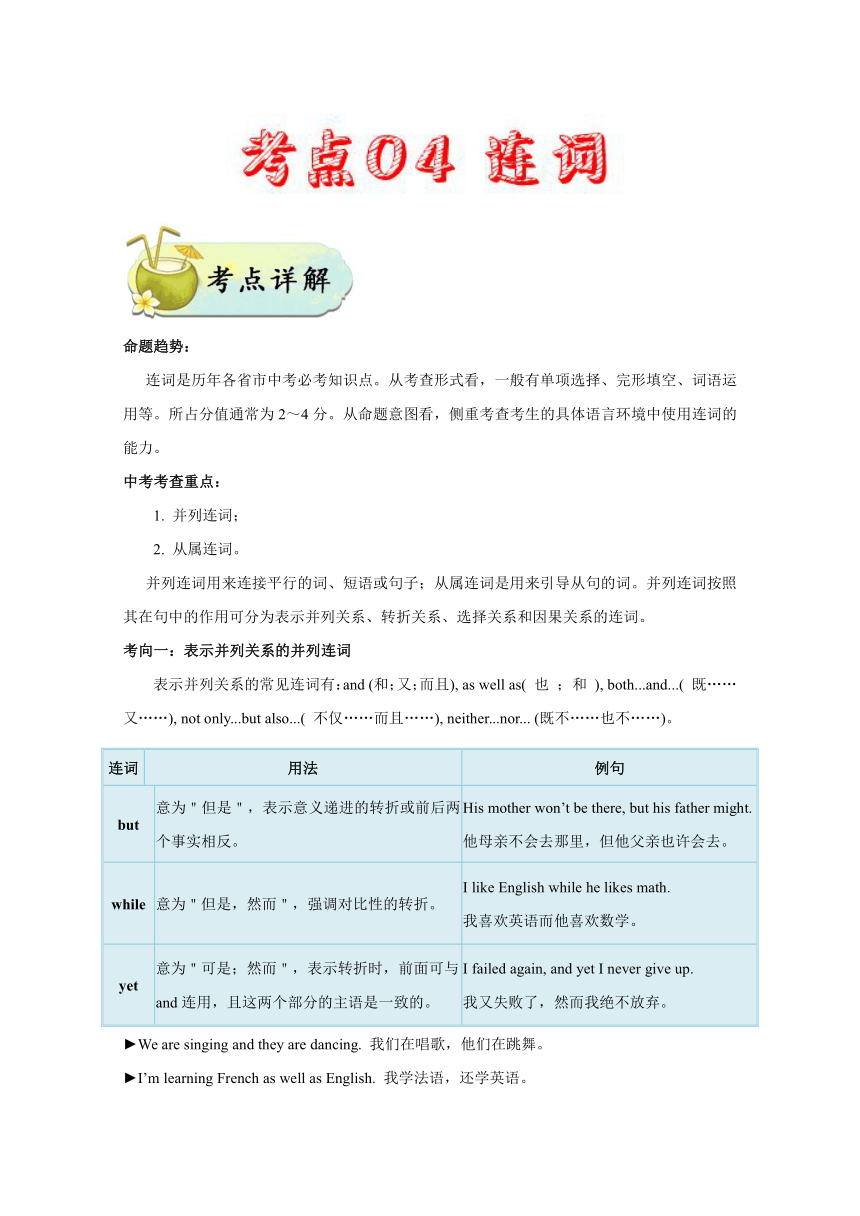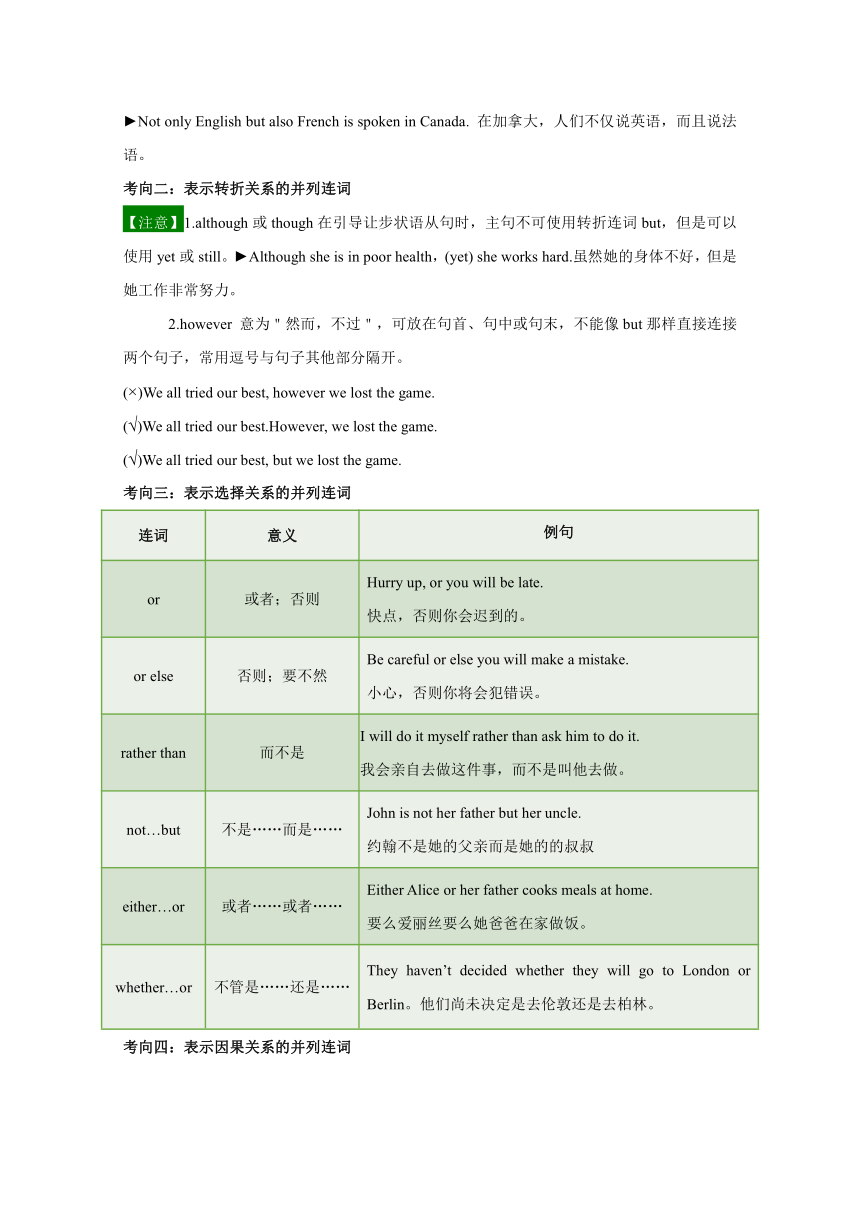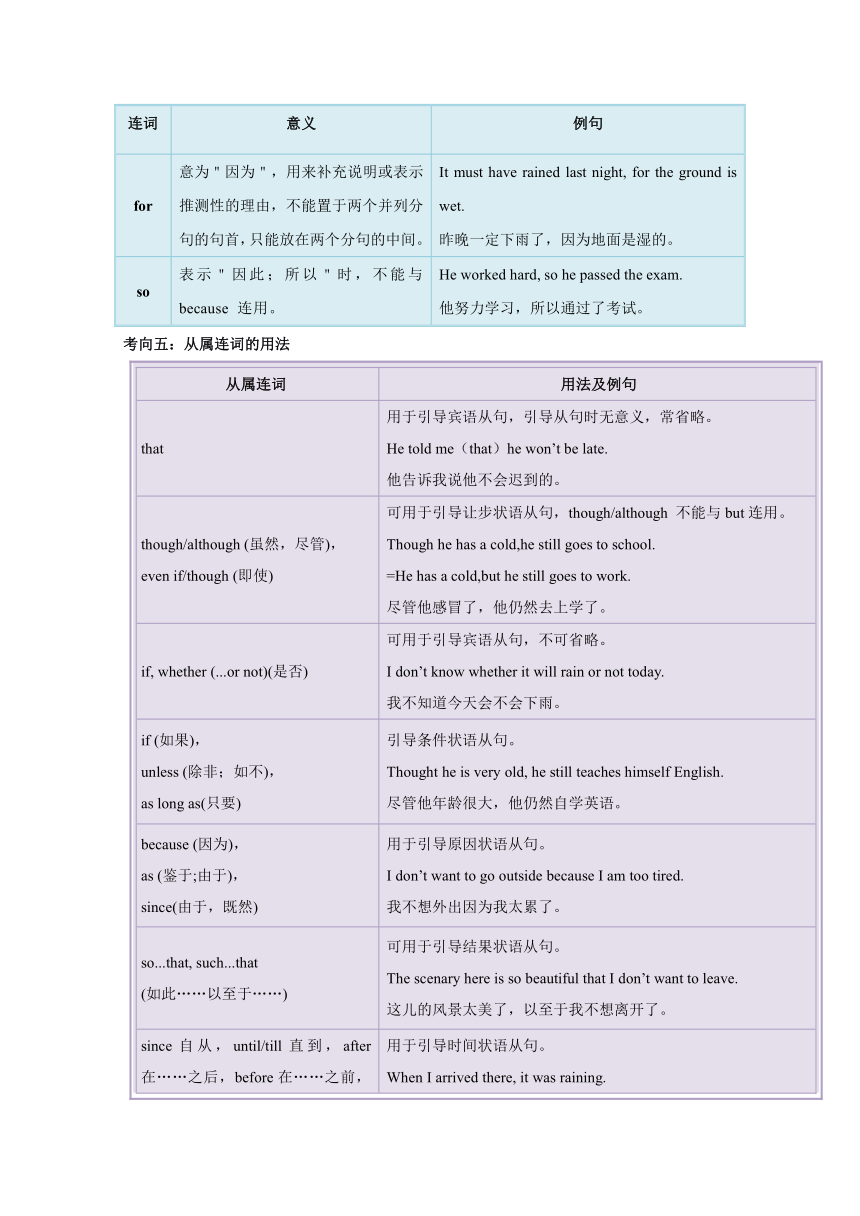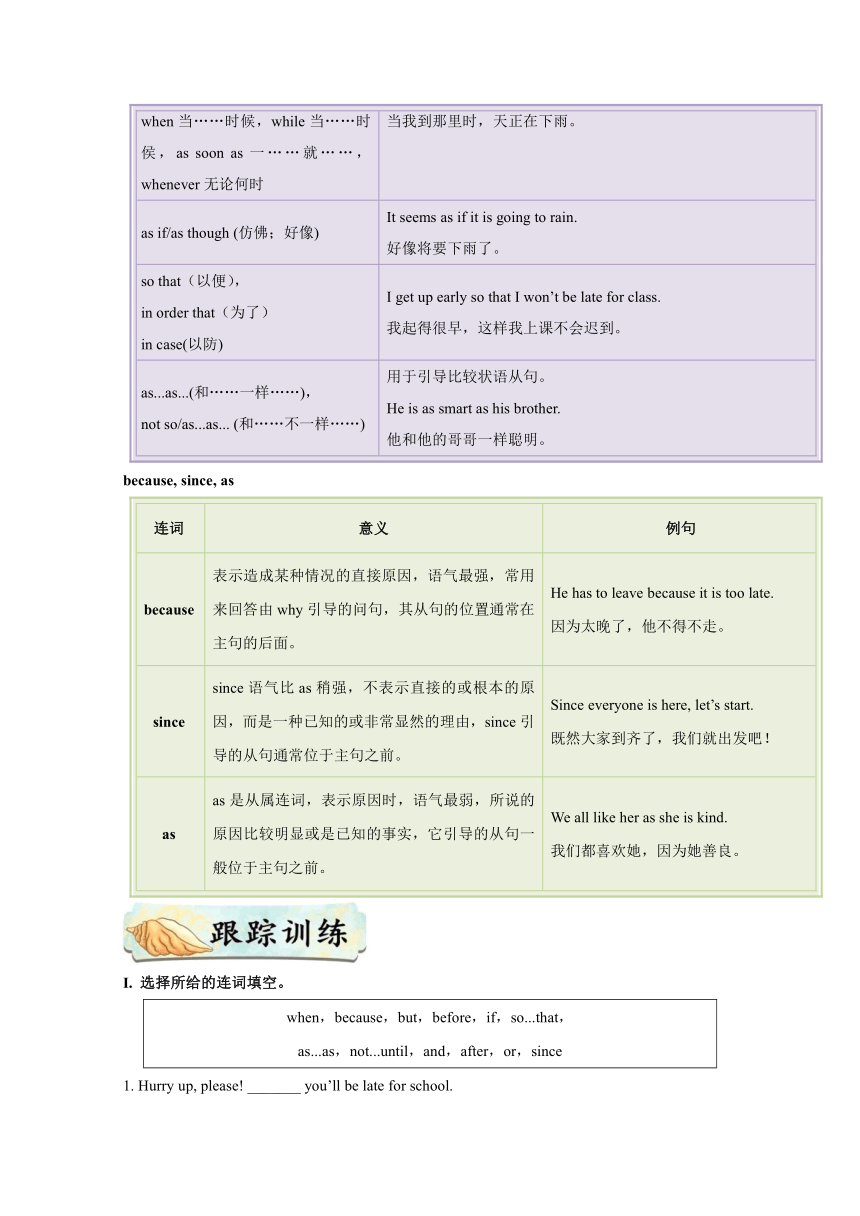2023-2024学年中考专项复习专题4:连词(含解析)
文档属性
| 名称 | 2023-2024学年中考专项复习专题4:连词(含解析) |

|
|
| 格式 | docx | ||
| 文件大小 | 590.7KB | ||
| 资源类型 | 教案 | ||
| 版本资源 | 通用版 | ||
| 科目 | 英语 | ||
| 更新时间 | 2024-06-03 15:47:53 | ||
图片预览





文档简介
命题趋势:
连词是历年各省市中考必考知识点。从考查形式看,一般有单项选择、完形填空、词语运用等。所占分值通常为2~4分。从命题意图看,侧重考查考生的具体语言环境中使用连词的能力。
中考考查重点:
1. 并列连词;
2. 从属连词。
并列连词用来连接平行的词、短语或句子;从属连词是用来引导从句的词。并列连词按照其在句中的作用可分为表示并列关系、转折关系、选择关系和因果关系的连词。
考向一:表示并列关系的并列连词
表示并列关系的常见连词有:and (和;又;而且), as well as( 也 ; 和 ), both...and...( 既……又……), not only...but also...( 不仅……而且……), neither...nor... (既不……也不……)。
连词 用法 例句
but 意为"但是",表示意义递进的转折或前后两个事实相反。 His mother won’t be there, but his father might. 他母亲不会去那里,但他父亲也许会去。
while 意为"但是,然而",强调对比性的转折。 I like English while he likes math. 我喜欢英语而他喜欢数学。
yet 意为"可是;然而",表示转折时,前面可与and连用,且这两个部分的主语是一致的。 I failed again, and yet I never give up. 我又失败了,然而我绝不放弃。
We are singing and they are dancing. 我们在唱歌,他们在跳舞。
I’m learning French as well as English. 我学法语,还学英语。
Not only English but also French is spoken in Canada. 在加拿大,人们不仅说英语,而且说法语。
考向二:表示转折关系的并列连词
【注意】1.although或though在引导让步状语从句时,主句不可使用转折连词but,但是可以使用yet或still。 Although she is in poor health,(yet) she works hard.虽然她的身体不好,但是她工作非常努力。
2.however 意为"然而,不过",可放在句首、句中或句末,不能像but那样直接连接两个句子,常用逗号与句子其他部分隔开。
(×)We all tried our best, however we lost the game.
(√)We all tried our best.However, we lost the game.
(√)We all tried our best, but we lost the game.
考向三:表示选择关系的并列连词
连词 意义 例句
or 或者;否则 Hurry up, or you will be late. 快点,否则你会迟到的。
or else 否则;要不然 Be careful or else you will make a mistake. 小心,否则你将会犯错误。
rather than 而不是 I will do it myself rather than ask him to do it. 我会亲自去做这件事,而不是叫他去做。
not…but 不是……而是…… John is not her father but her uncle. 约翰不是她的父亲而是她的的叔叔
either…or 或者……或者…… Either Alice or her father cooks meals at home. 要么爱丽丝要么她爸爸在家做饭。
whether…or 不管是……还是…… They haven’t decided whether they will go to London or Berlin。他们尚未决定是去伦敦还是去柏林。
考向四:表示因果关系的并列连词
连词 意义 例句
for 意为"因为",用来补充说明或表示推测性的理由,不能置于两个并列分句的句首,只能放在两个分句的中间。 It must have rained last night, for the ground is wet. 昨晚一定下雨了,因为地面是湿的。
so 表示"因此;所以"时,不能与because 连用。 He worked hard, so he passed the exam. 他努力学习,所以通过了考试。
考向五:从属连词的用法
从属连词 用法及例句
that 用于引导宾语从句,引导从句时无意义,常省略。 He told me(that)he won’t be late. 他告诉我说他不会迟到的。
though/although (虽然,尽管), even if/though (即使) 可用于引导让步状语从句,though/although 不能与but连用。 Though he has a cold,he still goes to school. =He has a cold,but he still goes to work. 尽管他感冒了,他仍然去上学了。
if, whether (...or not)(是否) 可用于引导宾语从句,不可省略。 I don’t know whether it will rain or not today. 我不知道今天会不会下雨。
if (如果), unless (除非;如不), as long as(只要) 引导条件状语从句。 Thought he is very old, he still teaches himself English. 尽管他年龄很大,他仍然自学英语。
because (因为), as (鉴于;由于), since(由于,既然) 用于引导原因状语从句。 I don’t want to go outside because I am too tired. 我不想外出因为我太累了。
so...that, such...that (如此……以至于……) 可用于引导结果状语从句。 The scenary here is so beautiful that I don’t want to leave. 这儿的风景太美了,以至于我不想离开了。
since自从,until/till直到,after在……之后,before在……之前,when当……时候,while当……时侯,as soon as一……就……,whenever无论何时 用于引导时间状语从句。 When I arrived there, it was raining. 当我到那里时,天正在下雨。
as if/as though (仿佛;好像) It seems as if it is going to rain. 好像将要下雨了。
so that(以便), in order that(为了) in case(以防) I get up early so that I won’t be late for class. 我起得很早,这样我上课不会迟到。
as...as...(和……一样……), not so/as...as... (和……不一样……) 用于引导比较状语从句。 He is as smart as his brother. 他和他的哥哥一样聪明。
because, since, as
连词 意义 例句
because 表示造成某种情况的直接原因,语气最强,常用来回答由why引导的问句,其从句的位置通常在主句的后面。 He has to leave because it is too late. 因为太晚了,他不得不走。
since since语气比as稍强,不表示直接的或根本的原因,而是一种已知的或非常显然的理由,since引导的从句通常位于主句之前。 Since everyone is here, let’s start. 既然大家到齐了,我们就出发吧!
as as是从属连词,表示原因时,语气最弱,所说的原因比较明显或是已知的事实,它引导的从句一般位于主句之前。 We all like her as she is kind. 我们都喜欢她,因为她善良。
I. 选择所给的连词填空。
when,because,but,before,if,so...that, as...as,not...until,and,after,or,since
1. Hurry up, please! _______ you’ll be late for school.
2. She ________ go to bed ______ her mother came back.
3. Yesterday Jim didn’t go to see the film, ________he must go over his lessons.
4. The students were talking about the sports meeting _______ the teacher came in.
5. I was ______tired ________I couldn’t walk any more.
6. This building is _______ tall ________ that one.
7. Tom was ill yesterday, ________he still went to school as usual.
8. He asked me ______I would go there with him.
9. We have studied here ________ 1994.
10. The child had studied English for two years ________ he went to middle school.
11. _______ the boy finished his homework, he went to bed.
12. Study hard on your subjects, ________ you’ll do well in the exam.
II. 单项选择。
1. I like listening to English songs because it can __________ make me relaxed __________ improve my spoken English.
A. neither;nor B. either;or
C. not only;but also D. not;but
2. On no-car day, __________ students __________ teachers are allowed to drive to school.
A. either;or B. not only;but also
C. neither;nor D. both;and
3. —Would you like tea __________ Juice
—Tea, please.
A. and B. or C. but D. so
4. —Join our educational exchange now. You can improve your social skills __________ make lots of friends.
—It sounds great. I’d love to.
A. and B. but C. except
5. —Would you like hamburgers __________ hot dogs
—Hot dogs.
A. and B. too C. as well as D. or
1. Bob, dinner is ready. Please wash your hands __________ you eat.
A. until B. after C. while D. before
2. —What do you think of your junior high school life
—I think it is enjoyable, __________ I sometimes have some trouble in study.
A. if B. though C. while D. until
3. —Can students go online during lessons
—They can __________ it is for that lesson.
A. if B. or C. so D. but
4. Tony was drawing a picture __________ I was doing my homework.
A. if B. because C. while D. until
5. —It has been much easier for me to go to work __________ shared bikes appeared.
—But they also caused plenty of problems.
A. since B. before C. unless D. though
6. __________ Anna __________ her brother like listening to soft music.
A. Both; and B. Neither; nor C. Either; or D. Not only; but also
7. Betty kept silent at first __________ soon she joined the other girls, chatting and laughing.
A. so B. but C. or D. because
8. Lots of people exercise every morning __________ bad weather stops them.
A. if B. unless C. until D. since
9. She stopped talking __________ her mother came into the room.
A. as soon as B. unless C. though
10. —Thank you for telling me so much knowledge about nature.
—Don’t mention it. __________ you have more questions, come to me any time.
A. If B. Because C. Though
11.My grandfather does Chinese Kung Fu every day __________ he is over eighty.
A. since B. though C. until
12. I know his face __________ I can’t remember his name.
A. and B. but C. or D. so
13.—Mike, let’s prepare for our baseball game.
—OK. We’ll lose the game __________ we try our best.
A. unless B. once C. after D. since
14.Hold your dream, __________ you might regret some day.
A. and B. or C. but D. so
15.Jack’s mother was so tired. She fell asleep __________ she lay down on the bed.
A. until B. as soon as C. unless
16.Many people like reading newspapers __________ they can learn what’s happening in the world.
A. so that B. ever since
C. as soon as D. even though
17.I didn’t believe I could do it __________ I got to the top of Mount Tai.
A. unless B. until C. after D. as
18.Many people still try to climb Qomolangma every year __________ it is very dangerous.
A. when B. if C. though
19.You will never achieve success __________ you devote yourself to your work.
A. after B. if C. because D. unless
20.—The plane won’t take off __________ the thick clouds move away.
—Let’s wait patiently for the announcement from the airport.
A. since B. though C. while D. until
21.I won’t go home __________ the rain stops.
A. since B. so C. until
22. Our teachers have been with us for nearly three years __________ we came to junior high school. We should thank them for what they have done for us.
A. until B. before C. since
1. He didn’t get used to the life in Australia __________ he graduated from college.
A. because B. until C. when D. but
2. —Do you think Jack will catch up with us
—I believe so. __________ he loses himself in computer games.
A. If B. Unless C. Or
3. He was __________ tired __________ he could not go on walking
A. too; to B. such; that C. so; that D. too; that
4.I’d like to go shopping with you, __________ I’m busy today.
A. so B. but C. and D. because
5. It is true that he is a model worker, __________ he is not a good father for his son.
A. so B. and C. but D. for
6. Jill still went to school __________ she was ill yesterday.
A. even though B. no matter C. as long as D. so that
7. —Mum, can I go out to play for a while
—No, you can’t, __________ you finish your homework.
A. until B. if C. unless D. because
8.I argued with my best friend yesterday, __________ he was still willing to help me.
A. so B. but C. and D. or
跟踪训练
I. 选择所给的连词填空。
1. or 2. didn’t;until 3. because 4. when 5. so;that
6. as;as 7. so 8. if 9. since 10. before
11. After 12. and
II. 单项选择。
2. C 【解析】句意:在无车日,学生和老师都不被允许开车去学校。either...or 或者……或者;not only...but also不仅……而且;neither...nor 既不……也不;both... and……和……都;根据On no-car day可知此处表示无车日,因此老师和学生都不开车,故选C。
3. B 【解析】句意:——你想要茶还是桔汁?——请给我来点儿茶。根据句意,结合tea和juice为名词,需要并列连词,而且根据答语做出了选择,因此需要使用or表示选择。故答案为B。
4. A 【解析】句意:——现在就加入我们的教育交流活动。你可以提高你的社交技能和广交朋友。——听起来很棒。我很乐意去。A. and而且,表示并列关系;B. but但是,表示转折关系;C. except除了……外。前后句是并列关系,故答案为A。
5. D 【解析】句意:——你要汉堡还是热狗?——热狗。A. and和,并且,表示并列、递进;B. too太,修饰形容词、副词,也,用于肯定句句尾。C. as well as也,用于句中;D. or或者,表示选择。这是一个选择疑问句,选择疑问句里用or连接被选择的对象。故选D。
真题再现
1. D【解析】句意:鲍勃,晚饭准备好了。请在吃饭之前洗手。考查连词辨析题。A. until直到……才;B. after在……以后;C. while当……的时候,用于主句和从句动作同时发生;D. before在……以前。根据wash your hands(洗手),结合卫生常识,可知选D。
2. B【解析】句意:——你觉得你的初中生活怎么样?——我觉得很愉快,虽然我有时在学习上遇到一些困难。A. if 如果;B. though尽管;C. while正当……时候;D. until直到…才。结合语境理解可知,学习中遇到困难与愉快之间表示让步关系,故答案为B。
3. A【解析】句意:——学生可以在课上上网吗?——如果是为了上课,他们可以上网。考查连词辨析题。if如果,表条件;or或者,表选择;so所以,表结果;but但是,表转折。答句是条件状语从句,需用if连接。根据句意结构,可知选A。
4. C【解析】句意:Tony 正在画画,而我在做作业。本题考查连词。由前后两句话的 was doing 能发现是两个过去进行时的动作,因此可以选用 while 链接,属于时间状语从句。与 A. if 引导的条件状语从句和 B. because 引导的原因状语从句无关。而 D. until 表示直到,与原句逻辑关系不符。故正确答案为C。
6. A【解析】句意:安娜和她弟弟都喜欢听轻音乐。根据both...and... 两者都……,连接句子两个主语时,谓语动词用复数;neither...nor...既不……也不……,当连接句子的两个主语时,谓语动词就近原则;either...or...或者……或者……,当连接句子的两个主语时,谓语动词就近原则;Not only... but also...不仅……而且……,当连接句子的两个主语时,谓语动词就近原则;根据like故选A
【点睛】both...and...两者都……,连接句子的两个相同成分,例如:Both Lily and Lucy are students.;Neither...nor...既不……也不……,其含义是否定的,可连接任意两个并列的成分,当连接句子的两个主语时,谓语动词就近原则。例如:Neither dad nor mum is at home today;either...or...或者……或者……,表示两者之一,两节句子的两个并列成分,,当连接句子的两个主语时,谓语动词就近原则。例如:Either you or me am going there。
7. B【解析】句意:贝蒂一开口就保持沉默,但是不久她就加入了其他女孩,一起聊天和笑。选项A"所以",选项B"但是",选项C"或者",选项D"因为",前半句中的贝蒂是沉默的,后来开始聊天,开始欢笑,说明有明显的转折关系,故选B。
8. B【解析】考查连词词义辨析。A. if"如果";B. unless"除非;如果不";C. until"直到";D. since"自从;既然"。句意:很多人每天早晨锻炼 _______ 恶劣的天气阻拦他们。结合选项的意思和句意可知,用unless。故选B。
9. A【解析】句意:她妈妈一进到房间里,她就停止了说话。A. as soon as一……就……;B. unless除非;C. though尽管。这里是考察连词,根据She stopped talking 和her mother came into the room.之间的关系,可知是妈妈一进到房间里,她就停止了说话;故选A。
11. B【解析】句意:我爷爷每天练中国功夫,尽管他80多了。A. since 自从,因为;B. though尽管;C. until直到。根据My grandfather does Chinese Kung Fu every day和he is over eighty.之间让步关系,尽管;故选B。
12. B【解析】句意:我认得他的脸,但不记得他的名字。本题主要考查连词辨析。A. and"和",表示并列;B. but "但是",表转折;C. or "否则",表假设关系;D. so"所以",表示结果。根据题干"I know his face"(我认得他的脸)与"I can’t remember his name"(不记得他的名字)的关系,可知这里是一种转折关系,因此but符合题意,故答案选B。
13. A 【解析】句意:——迈克,让我们为我们的棒球比赛做准备吧。——好的,如果我们不尽力我们就会输掉比赛。A. unless 如果不,引导条件状语从句;B. once一……就……,引导时间(条件)状语从句;C. after在……后,引导时间状语从句;D. since自从……,引导时间状语从句。故选A。
14. B 【解析】句意:坚持你的梦想,否则你有一天会后悔的。A. and并且,表示并列关系;B. or 用于连接两个并列的句子,表示"否则,要不然"的意思;C. but但是,表示转折关系;D. so所以,表示结果。故选B。
15. B 【解析】句意:杰克的妈妈是那么地累。她一躺到床上就睡着了。until直到……,引导时间状语从句;as soon as一……就……,引导时间状语从句;unless如果不,除非,引导条件状语从句。故选B。
16. A 【解析】句意:许多人喜欢阅读报纸以便他们能了解世界上正在发生什么事情。A. so that 以便,为了,引导目的状语从句;B. ever since自从,引导时间状语从句;C. as soon as一……就……;引导时间状语从句;D. even though即使,尽管,引导让步状语从句。故选A。
17. B 【解析】句意:直到我到达泰山顶上我才相信我能成功。A. unless如果不,除非,引导条件状语从句;B. until直到,引导时间状语从句;C. after 在……后,引导时间状语从句;D. as因为,由于,引导原因状语从句。not …until直到……才,故选B。
18. C 【解析】句意:每年仍然有许多人试图去爬珠穆朗玛峰,尽管那是很危险的。A. when当……的时候;B. if 如果;C. though尽管。故选C。
19. D 【解析】句意:除非你全身心投入工作,否则你永远不会成功。A. after在……之后;B. if如果;C. because因为;D. unless除非。故选D。
21. C 【解析】句意:我直到火车停下才回家。A. since自从,由于;B. so因此;C. until直到。not…until直到……才,根据句意故选C。
22. C 【解析】句意:自上初中以来,老师们和我们在一起将近三年了。我们应该感谢他们为我们所做的一切。A. until直到……才;B. before在……以前;C. since自从……以来。根据句意,并区别三个连词的意思,可以排除A、B选项。故选C。
模拟检测
1. B【解析】考查连词。句意:直到大学毕业他才习惯了在澳大利亚的生活。because因为;until直到;when当……的时候; but但是。not…until直到……才……,是一个固定句型,所以选B。
2. B【解析】句意:——你认为杰克能赶上我们吗?——我相信能,除非他迷上电脑游戏。A. If 如果,是否;B. Unless除非;C. Or否则;根据I believe so.和 he loses himself in computer games.可知是除非迷上电脑游戏;故选B。
3. C【解析】句意:他太累了,不能继续走了。too+形容词/副词+to do sth. 意为"太……不能……";so ...that...如此……以致……,引导结果状语从句。such修饰名词,tired 形容词,劳累的。故选C。
【点睛】so (adv.)表示"如此"、"这样"的意思, 用作副词, 修饰形容词和副词。主要结构有:1. so + adj. +a/an +可数名词单数+that从句。 2. so+ adj./adv. + that从句。3.so+many/few/much/little+复数可数名词+that从句。such(adj.)表示"如此""这样"的意思,用作形容词, 修饰名词。主要结构有:1. such + a/an + adj.+单数可数名词+that从句。2. such + adj.+ 不可数名词+that从句。3. such + adj.+ 复数可数名词+that从句。
4. B【解析】句意:我想和你一起去购物,但我今天很忙。A. so 因此,表示结果;B. but但是,表示转折;C. and 和,表示并列;D. because因为,表示原因。根据语义可知,前后文表示"转折"关系。所以选B。
6. A【解析】句意:即使吉尔昨天病了,他仍旧去上学。A即使;B无论;C只要;D于是。故选A。
【点睛】此题考查连词的用法。要熟练掌握初中阶段出现的状语从句及引导状语从句的连词。even though 引导的从句内容往往是真实的,主要用于引出不利用于主句情况的信息,相当于汉语的"尽管""虽然"。
7. C【解析】句意:——妈妈,我能出去玩会吗?——不,不能,除非你完成家庭作业。A. until时间连词,直到; B. if连词,是否或如果; C. unless 条件连词,除非、若果不。D. because因果连词,因为。根据句意可知假设了一个否定的条件。故选C。
【点睛】连词if可以引导宾语从句和条件状语从句。当if引导条件状语从句时,unless=if… not…,表示否定的条件。
8. B【解析】句意:我昨天和我最好的朋友吵架了,但他还是愿意帮助我。A. so因此;B. but 但是;C. and而且;D. or否则。前后句表示转折关系,故答案为B。
连词是历年各省市中考必考知识点。从考查形式看,一般有单项选择、完形填空、词语运用等。所占分值通常为2~4分。从命题意图看,侧重考查考生的具体语言环境中使用连词的能力。
中考考查重点:
1. 并列连词;
2. 从属连词。
并列连词用来连接平行的词、短语或句子;从属连词是用来引导从句的词。并列连词按照其在句中的作用可分为表示并列关系、转折关系、选择关系和因果关系的连词。
考向一:表示并列关系的并列连词
表示并列关系的常见连词有:and (和;又;而且), as well as( 也 ; 和 ), both...and...( 既……又……), not only...but also...( 不仅……而且……), neither...nor... (既不……也不……)。
连词 用法 例句
but 意为"但是",表示意义递进的转折或前后两个事实相反。 His mother won’t be there, but his father might. 他母亲不会去那里,但他父亲也许会去。
while 意为"但是,然而",强调对比性的转折。 I like English while he likes math. 我喜欢英语而他喜欢数学。
yet 意为"可是;然而",表示转折时,前面可与and连用,且这两个部分的主语是一致的。 I failed again, and yet I never give up. 我又失败了,然而我绝不放弃。
We are singing and they are dancing. 我们在唱歌,他们在跳舞。
I’m learning French as well as English. 我学法语,还学英语。
Not only English but also French is spoken in Canada. 在加拿大,人们不仅说英语,而且说法语。
考向二:表示转折关系的并列连词
【注意】1.although或though在引导让步状语从句时,主句不可使用转折连词but,但是可以使用yet或still。 Although she is in poor health,(yet) she works hard.虽然她的身体不好,但是她工作非常努力。
2.however 意为"然而,不过",可放在句首、句中或句末,不能像but那样直接连接两个句子,常用逗号与句子其他部分隔开。
(×)We all tried our best, however we lost the game.
(√)We all tried our best.However, we lost the game.
(√)We all tried our best, but we lost the game.
考向三:表示选择关系的并列连词
连词 意义 例句
or 或者;否则 Hurry up, or you will be late. 快点,否则你会迟到的。
or else 否则;要不然 Be careful or else you will make a mistake. 小心,否则你将会犯错误。
rather than 而不是 I will do it myself rather than ask him to do it. 我会亲自去做这件事,而不是叫他去做。
not…but 不是……而是…… John is not her father but her uncle. 约翰不是她的父亲而是她的的叔叔
either…or 或者……或者…… Either Alice or her father cooks meals at home. 要么爱丽丝要么她爸爸在家做饭。
whether…or 不管是……还是…… They haven’t decided whether they will go to London or Berlin。他们尚未决定是去伦敦还是去柏林。
考向四:表示因果关系的并列连词
连词 意义 例句
for 意为"因为",用来补充说明或表示推测性的理由,不能置于两个并列分句的句首,只能放在两个分句的中间。 It must have rained last night, for the ground is wet. 昨晚一定下雨了,因为地面是湿的。
so 表示"因此;所以"时,不能与because 连用。 He worked hard, so he passed the exam. 他努力学习,所以通过了考试。
考向五:从属连词的用法
从属连词 用法及例句
that 用于引导宾语从句,引导从句时无意义,常省略。 He told me(that)he won’t be late. 他告诉我说他不会迟到的。
though/although (虽然,尽管), even if/though (即使) 可用于引导让步状语从句,though/although 不能与but连用。 Though he has a cold,he still goes to school. =He has a cold,but he still goes to work. 尽管他感冒了,他仍然去上学了。
if, whether (...or not)(是否) 可用于引导宾语从句,不可省略。 I don’t know whether it will rain or not today. 我不知道今天会不会下雨。
if (如果), unless (除非;如不), as long as(只要) 引导条件状语从句。 Thought he is very old, he still teaches himself English. 尽管他年龄很大,他仍然自学英语。
because (因为), as (鉴于;由于), since(由于,既然) 用于引导原因状语从句。 I don’t want to go outside because I am too tired. 我不想外出因为我太累了。
so...that, such...that (如此……以至于……) 可用于引导结果状语从句。 The scenary here is so beautiful that I don’t want to leave. 这儿的风景太美了,以至于我不想离开了。
since自从,until/till直到,after在……之后,before在……之前,when当……时候,while当……时侯,as soon as一……就……,whenever无论何时 用于引导时间状语从句。 When I arrived there, it was raining. 当我到那里时,天正在下雨。
as if/as though (仿佛;好像) It seems as if it is going to rain. 好像将要下雨了。
so that(以便), in order that(为了) in case(以防) I get up early so that I won’t be late for class. 我起得很早,这样我上课不会迟到。
as...as...(和……一样……), not so/as...as... (和……不一样……) 用于引导比较状语从句。 He is as smart as his brother. 他和他的哥哥一样聪明。
because, since, as
连词 意义 例句
because 表示造成某种情况的直接原因,语气最强,常用来回答由why引导的问句,其从句的位置通常在主句的后面。 He has to leave because it is too late. 因为太晚了,他不得不走。
since since语气比as稍强,不表示直接的或根本的原因,而是一种已知的或非常显然的理由,since引导的从句通常位于主句之前。 Since everyone is here, let’s start. 既然大家到齐了,我们就出发吧!
as as是从属连词,表示原因时,语气最弱,所说的原因比较明显或是已知的事实,它引导的从句一般位于主句之前。 We all like her as she is kind. 我们都喜欢她,因为她善良。
I. 选择所给的连词填空。
when,because,but,before,if,so...that, as...as,not...until,and,after,or,since
1. Hurry up, please! _______ you’ll be late for school.
2. She ________ go to bed ______ her mother came back.
3. Yesterday Jim didn’t go to see the film, ________he must go over his lessons.
4. The students were talking about the sports meeting _______ the teacher came in.
5. I was ______tired ________I couldn’t walk any more.
6. This building is _______ tall ________ that one.
7. Tom was ill yesterday, ________he still went to school as usual.
8. He asked me ______I would go there with him.
9. We have studied here ________ 1994.
10. The child had studied English for two years ________ he went to middle school.
11. _______ the boy finished his homework, he went to bed.
12. Study hard on your subjects, ________ you’ll do well in the exam.
II. 单项选择。
1. I like listening to English songs because it can __________ make me relaxed __________ improve my spoken English.
A. neither;nor B. either;or
C. not only;but also D. not;but
2. On no-car day, __________ students __________ teachers are allowed to drive to school.
A. either;or B. not only;but also
C. neither;nor D. both;and
3. —Would you like tea __________ Juice
—Tea, please.
A. and B. or C. but D. so
4. —Join our educational exchange now. You can improve your social skills __________ make lots of friends.
—It sounds great. I’d love to.
A. and B. but C. except
5. —Would you like hamburgers __________ hot dogs
—Hot dogs.
A. and B. too C. as well as D. or
1. Bob, dinner is ready. Please wash your hands __________ you eat.
A. until B. after C. while D. before
2. —What do you think of your junior high school life
—I think it is enjoyable, __________ I sometimes have some trouble in study.
A. if B. though C. while D. until
3. —Can students go online during lessons
—They can __________ it is for that lesson.
A. if B. or C. so D. but
4. Tony was drawing a picture __________ I was doing my homework.
A. if B. because C. while D. until
5. —It has been much easier for me to go to work __________ shared bikes appeared.
—But they also caused plenty of problems.
A. since B. before C. unless D. though
6. __________ Anna __________ her brother like listening to soft music.
A. Both; and B. Neither; nor C. Either; or D. Not only; but also
7. Betty kept silent at first __________ soon she joined the other girls, chatting and laughing.
A. so B. but C. or D. because
8. Lots of people exercise every morning __________ bad weather stops them.
A. if B. unless C. until D. since
9. She stopped talking __________ her mother came into the room.
A. as soon as B. unless C. though
10. —Thank you for telling me so much knowledge about nature.
—Don’t mention it. __________ you have more questions, come to me any time.
A. If B. Because C. Though
11.My grandfather does Chinese Kung Fu every day __________ he is over eighty.
A. since B. though C. until
12. I know his face __________ I can’t remember his name.
A. and B. but C. or D. so
13.—Mike, let’s prepare for our baseball game.
—OK. We’ll lose the game __________ we try our best.
A. unless B. once C. after D. since
14.Hold your dream, __________ you might regret some day.
A. and B. or C. but D. so
15.Jack’s mother was so tired. She fell asleep __________ she lay down on the bed.
A. until B. as soon as C. unless
16.Many people like reading newspapers __________ they can learn what’s happening in the world.
A. so that B. ever since
C. as soon as D. even though
17.I didn’t believe I could do it __________ I got to the top of Mount Tai.
A. unless B. until C. after D. as
18.Many people still try to climb Qomolangma every year __________ it is very dangerous.
A. when B. if C. though
19.You will never achieve success __________ you devote yourself to your work.
A. after B. if C. because D. unless
20.—The plane won’t take off __________ the thick clouds move away.
—Let’s wait patiently for the announcement from the airport.
A. since B. though C. while D. until
21.I won’t go home __________ the rain stops.
A. since B. so C. until
22. Our teachers have been with us for nearly three years __________ we came to junior high school. We should thank them for what they have done for us.
A. until B. before C. since
1. He didn’t get used to the life in Australia __________ he graduated from college.
A. because B. until C. when D. but
2. —Do you think Jack will catch up with us
—I believe so. __________ he loses himself in computer games.
A. If B. Unless C. Or
3. He was __________ tired __________ he could not go on walking
A. too; to B. such; that C. so; that D. too; that
4.I’d like to go shopping with you, __________ I’m busy today.
A. so B. but C. and D. because
5. It is true that he is a model worker, __________ he is not a good father for his son.
A. so B. and C. but D. for
6. Jill still went to school __________ she was ill yesterday.
A. even though B. no matter C. as long as D. so that
7. —Mum, can I go out to play for a while
—No, you can’t, __________ you finish your homework.
A. until B. if C. unless D. because
8.I argued with my best friend yesterday, __________ he was still willing to help me.
A. so B. but C. and D. or
跟踪训练
I. 选择所给的连词填空。
1. or 2. didn’t;until 3. because 4. when 5. so;that
6. as;as 7. so 8. if 9. since 10. before
11. After 12. and
II. 单项选择。
2. C 【解析】句意:在无车日,学生和老师都不被允许开车去学校。either...or 或者……或者;not only...but also不仅……而且;neither...nor 既不……也不;both... and……和……都;根据On no-car day可知此处表示无车日,因此老师和学生都不开车,故选C。
3. B 【解析】句意:——你想要茶还是桔汁?——请给我来点儿茶。根据句意,结合tea和juice为名词,需要并列连词,而且根据答语做出了选择,因此需要使用or表示选择。故答案为B。
4. A 【解析】句意:——现在就加入我们的教育交流活动。你可以提高你的社交技能和广交朋友。——听起来很棒。我很乐意去。A. and而且,表示并列关系;B. but但是,表示转折关系;C. except除了……外。前后句是并列关系,故答案为A。
5. D 【解析】句意:——你要汉堡还是热狗?——热狗。A. and和,并且,表示并列、递进;B. too太,修饰形容词、副词,也,用于肯定句句尾。C. as well as也,用于句中;D. or或者,表示选择。这是一个选择疑问句,选择疑问句里用or连接被选择的对象。故选D。
真题再现
1. D【解析】句意:鲍勃,晚饭准备好了。请在吃饭之前洗手。考查连词辨析题。A. until直到……才;B. after在……以后;C. while当……的时候,用于主句和从句动作同时发生;D. before在……以前。根据wash your hands(洗手),结合卫生常识,可知选D。
2. B【解析】句意:——你觉得你的初中生活怎么样?——我觉得很愉快,虽然我有时在学习上遇到一些困难。A. if 如果;B. though尽管;C. while正当……时候;D. until直到…才。结合语境理解可知,学习中遇到困难与愉快之间表示让步关系,故答案为B。
3. A【解析】句意:——学生可以在课上上网吗?——如果是为了上课,他们可以上网。考查连词辨析题。if如果,表条件;or或者,表选择;so所以,表结果;but但是,表转折。答句是条件状语从句,需用if连接。根据句意结构,可知选A。
4. C【解析】句意:Tony 正在画画,而我在做作业。本题考查连词。由前后两句话的 was doing 能发现是两个过去进行时的动作,因此可以选用 while 链接,属于时间状语从句。与 A. if 引导的条件状语从句和 B. because 引导的原因状语从句无关。而 D. until 表示直到,与原句逻辑关系不符。故正确答案为C。
6. A【解析】句意:安娜和她弟弟都喜欢听轻音乐。根据both...and... 两者都……,连接句子两个主语时,谓语动词用复数;neither...nor...既不……也不……,当连接句子的两个主语时,谓语动词就近原则;either...or...或者……或者……,当连接句子的两个主语时,谓语动词就近原则;Not only... but also...不仅……而且……,当连接句子的两个主语时,谓语动词就近原则;根据like故选A
【点睛】both...and...两者都……,连接句子的两个相同成分,例如:Both Lily and Lucy are students.;Neither...nor...既不……也不……,其含义是否定的,可连接任意两个并列的成分,当连接句子的两个主语时,谓语动词就近原则。例如:Neither dad nor mum is at home today;either...or...或者……或者……,表示两者之一,两节句子的两个并列成分,,当连接句子的两个主语时,谓语动词就近原则。例如:Either you or me am going there。
7. B【解析】句意:贝蒂一开口就保持沉默,但是不久她就加入了其他女孩,一起聊天和笑。选项A"所以",选项B"但是",选项C"或者",选项D"因为",前半句中的贝蒂是沉默的,后来开始聊天,开始欢笑,说明有明显的转折关系,故选B。
8. B【解析】考查连词词义辨析。A. if"如果";B. unless"除非;如果不";C. until"直到";D. since"自从;既然"。句意:很多人每天早晨锻炼 _______ 恶劣的天气阻拦他们。结合选项的意思和句意可知,用unless。故选B。
9. A【解析】句意:她妈妈一进到房间里,她就停止了说话。A. as soon as一……就……;B. unless除非;C. though尽管。这里是考察连词,根据She stopped talking 和her mother came into the room.之间的关系,可知是妈妈一进到房间里,她就停止了说话;故选A。
11. B【解析】句意:我爷爷每天练中国功夫,尽管他80多了。A. since 自从,因为;B. though尽管;C. until直到。根据My grandfather does Chinese Kung Fu every day和he is over eighty.之间让步关系,尽管;故选B。
12. B【解析】句意:我认得他的脸,但不记得他的名字。本题主要考查连词辨析。A. and"和",表示并列;B. but "但是",表转折;C. or "否则",表假设关系;D. so"所以",表示结果。根据题干"I know his face"(我认得他的脸)与"I can’t remember his name"(不记得他的名字)的关系,可知这里是一种转折关系,因此but符合题意,故答案选B。
13. A 【解析】句意:——迈克,让我们为我们的棒球比赛做准备吧。——好的,如果我们不尽力我们就会输掉比赛。A. unless 如果不,引导条件状语从句;B. once一……就……,引导时间(条件)状语从句;C. after在……后,引导时间状语从句;D. since自从……,引导时间状语从句。故选A。
14. B 【解析】句意:坚持你的梦想,否则你有一天会后悔的。A. and并且,表示并列关系;B. or 用于连接两个并列的句子,表示"否则,要不然"的意思;C. but但是,表示转折关系;D. so所以,表示结果。故选B。
15. B 【解析】句意:杰克的妈妈是那么地累。她一躺到床上就睡着了。until直到……,引导时间状语从句;as soon as一……就……,引导时间状语从句;unless如果不,除非,引导条件状语从句。故选B。
16. A 【解析】句意:许多人喜欢阅读报纸以便他们能了解世界上正在发生什么事情。A. so that 以便,为了,引导目的状语从句;B. ever since自从,引导时间状语从句;C. as soon as一……就……;引导时间状语从句;D. even though即使,尽管,引导让步状语从句。故选A。
17. B 【解析】句意:直到我到达泰山顶上我才相信我能成功。A. unless如果不,除非,引导条件状语从句;B. until直到,引导时间状语从句;C. after 在……后,引导时间状语从句;D. as因为,由于,引导原因状语从句。not …until直到……才,故选B。
18. C 【解析】句意:每年仍然有许多人试图去爬珠穆朗玛峰,尽管那是很危险的。A. when当……的时候;B. if 如果;C. though尽管。故选C。
19. D 【解析】句意:除非你全身心投入工作,否则你永远不会成功。A. after在……之后;B. if如果;C. because因为;D. unless除非。故选D。
21. C 【解析】句意:我直到火车停下才回家。A. since自从,由于;B. so因此;C. until直到。not…until直到……才,根据句意故选C。
22. C 【解析】句意:自上初中以来,老师们和我们在一起将近三年了。我们应该感谢他们为我们所做的一切。A. until直到……才;B. before在……以前;C. since自从……以来。根据句意,并区别三个连词的意思,可以排除A、B选项。故选C。
模拟检测
1. B【解析】考查连词。句意:直到大学毕业他才习惯了在澳大利亚的生活。because因为;until直到;when当……的时候; but但是。not…until直到……才……,是一个固定句型,所以选B。
2. B【解析】句意:——你认为杰克能赶上我们吗?——我相信能,除非他迷上电脑游戏。A. If 如果,是否;B. Unless除非;C. Or否则;根据I believe so.和 he loses himself in computer games.可知是除非迷上电脑游戏;故选B。
3. C【解析】句意:他太累了,不能继续走了。too+形容词/副词+to do sth. 意为"太……不能……";so ...that...如此……以致……,引导结果状语从句。such修饰名词,tired 形容词,劳累的。故选C。
【点睛】so (adv.)表示"如此"、"这样"的意思, 用作副词, 修饰形容词和副词。主要结构有:1. so + adj. +a/an +可数名词单数+that从句。 2. so+ adj./adv. + that从句。3.so+many/few/much/little+复数可数名词+that从句。such(adj.)表示"如此""这样"的意思,用作形容词, 修饰名词。主要结构有:1. such + a/an + adj.+单数可数名词+that从句。2. such + adj.+ 不可数名词+that从句。3. such + adj.+ 复数可数名词+that从句。
4. B【解析】句意:我想和你一起去购物,但我今天很忙。A. so 因此,表示结果;B. but但是,表示转折;C. and 和,表示并列;D. because因为,表示原因。根据语义可知,前后文表示"转折"关系。所以选B。
6. A【解析】句意:即使吉尔昨天病了,他仍旧去上学。A即使;B无论;C只要;D于是。故选A。
【点睛】此题考查连词的用法。要熟练掌握初中阶段出现的状语从句及引导状语从句的连词。even though 引导的从句内容往往是真实的,主要用于引出不利用于主句情况的信息,相当于汉语的"尽管""虽然"。
7. C【解析】句意:——妈妈,我能出去玩会吗?——不,不能,除非你完成家庭作业。A. until时间连词,直到; B. if连词,是否或如果; C. unless 条件连词,除非、若果不。D. because因果连词,因为。根据句意可知假设了一个否定的条件。故选C。
【点睛】连词if可以引导宾语从句和条件状语从句。当if引导条件状语从句时,unless=if… not…,表示否定的条件。
8. B【解析】句意:我昨天和我最好的朋友吵架了,但他还是愿意帮助我。A. so因此;B. but 但是;C. and而且;D. or否则。前后句表示转折关系,故答案为B。
同课章节目录
- 词法
- 名词
- 动词和动词短语
- 动词语态
- 动词时态
- 助动词和情态动词
- 非谓语动词
- 冠词
- 代词
- 数词和量词
- 形容词副词及其比较等级
- 介词和介词短语
- 连词和感叹词
- 构词法
- 相似、相近词比较
- 句法
- 陈述句
- 一般疑问句和否定疑问句
- 特殊疑问句及选择疑问句
- 反意疑问句
- 存在句(There be句型)
- 宾语从句
- 定语从句
- 状语从句
- 主谓一致问题
- 简单句
- 并列句
- 复合句
- 主谓一致
- 主、表语从句
- 名词性从句
- 直接引语和间接引语
- 虚拟语气
- 感叹句
- 强调句
- 倒装句
- 祈使句
- 句子的成分
- 句子的分类
- 题型专区
- 单项选择部分
- 易错题
- 完形填空
- 阅读理解
- 词汇练习
- 听说训练
- 句型转换
- 补全对话
- 短文改错
- 翻译
- 书面表达
- 任务型阅读
- 语法填空
- 其他资料
